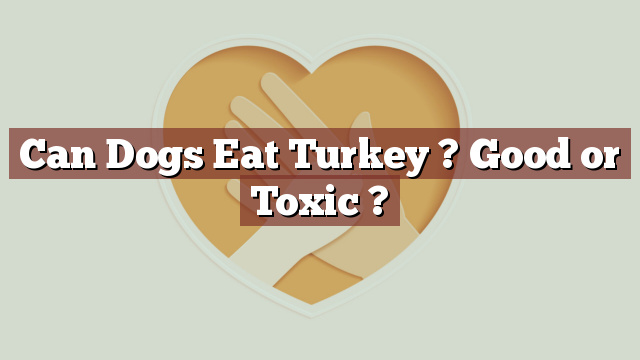Can Dogs Eat Turkey? Good or Toxic?
When it comes to our furry friends, it’s important to know what foods are safe for them to consume. Dogs have different dietary needs compared to humans, and certain foods that are safe for us may actually be harmful to them. In this article, we will explore whether or not dogs can eat turkey and uncover the potential risks and benefits associated with feeding them this poultry.
Nutritional Value of Turkey for Dogs: What Does it Contain?
Turkey is a popular protein source in many dog food formulas, and for good reason. It is packed with essential nutrients that can benefit our canine companions. Turkey is a lean meat that is low in fat and high in protein, making it an excellent choice for dogs who need to watch their weight. Additionally, turkey is a good source of vitamins B6 and B12, as well as minerals such as zinc and selenium. These nutrients are essential for a dog’s overall health and well-being.
Can Dogs Eat Turkey? Unveiling the Safety of This Poultry.
Yes, dogs can eat turkey, but it must be prepared and served in the right way. It is important to note that dogs should only consume plain, cooked turkey meat. Any seasonings, spices, or additives can be harmful to their digestive system. Furthermore, the turkey should be boneless and free from any skin or fat, as these can cause gastrointestinal issues such as pancreatitis. It is always best to consult with your veterinarian before introducing any new foods into your dog’s diet, including turkey.
Potential Risks or Benefits of Feeding Dogs Turkey.
Feeding dogs turkey in moderation can have several benefits. As mentioned earlier, it is a great source of lean protein, which can help build and repair tissues, support a healthy immune system, and promote muscle growth. Additionally, the vitamins and minerals found in turkey can contribute to a shiny coat, strong bones, and overall vitality.
However, there are some potential risks associated with feeding dogs turkey. As mentioned before, the skin and fat of the turkey can be difficult for dogs to digest, leading to digestive upset. Furthermore, some dogs may be allergic to turkey, so it is important to monitor for any signs of an adverse reaction, such as itching, vomiting, or diarrhea. If you suspect your dog is allergic to turkey, it is best to avoid feeding it to them altogether.
Dog Ate Turkey: Steps to Take and Signs to Monitor.
If your dog has consumed turkey, it is important to monitor them for any signs of discomfort or illness. Keep an eye out for symptoms such as vomiting, diarrhea, abdominal pain, or a lack of appetite. If any of these symptoms persist or worsen, it is crucial to seek veterinary assistance immediately. In some cases, turkey bones can also pose a choking hazard or cause intestinal blockage, so it is important to be vigilant and take appropriate action if your dog has ingested bones.
Conclusion: Dogs Can Enjoy Turkey, but Caution is Key.
In conclusion, dogs can safely enjoy turkey as part of their diet, provided it is prepared and served correctly. Plain, cooked turkey meat without any seasoning, skin, or fat can be a healthy addition to their meals. However, it is crucial to be aware of the potential risks associated with turkey, such as digestive upset or allergies. As with any new food, it is always best to consult with your veterinarian before introducing turkey into your dog’s diet. By exercising caution and monitoring your dog’s reactions, you can ensure that they can safely enjoy the benefits of this delicious poultry.
Thank you for investing your time in exploring [page_title] on Can-Eat.org. Our goal is to provide readers like you with thorough and reliable information about various dietary topics. Each article, including [page_title], stems from diligent research and a passion for understanding the nuances of our food choices. We believe that knowledge is a vital step towards making informed and healthy decisions. However, while "[page_title]" sheds light on its specific topic, it's crucial to remember that everyone's body reacts differently to foods and dietary changes. What might be beneficial for one person could have different effects on another. Before you consider integrating suggestions or insights from "[page_title]" into your diet, it's always wise to consult with a nutritionist or healthcare professional. Their specialized knowledge ensures that you're making choices best suited to your individual health needs. As you navigate [page_title], be mindful of potential allergies, intolerances, or unique dietary requirements you may have. No singular article can capture the vast diversity of human health, and individualized guidance is invaluable. The content provided in [page_title] serves as a general guide. It is not, by any means, a substitute for personalized medical or nutritional advice. Your health should always be the top priority, and professional guidance is the best path forward. In your journey towards a balanced and nutritious lifestyle, we hope that [page_title] serves as a helpful stepping stone. Remember, informed decisions lead to healthier outcomes. Thank you for trusting Can-Eat.org. Continue exploring, learning, and prioritizing your health. Cheers to a well-informed and healthier future!

